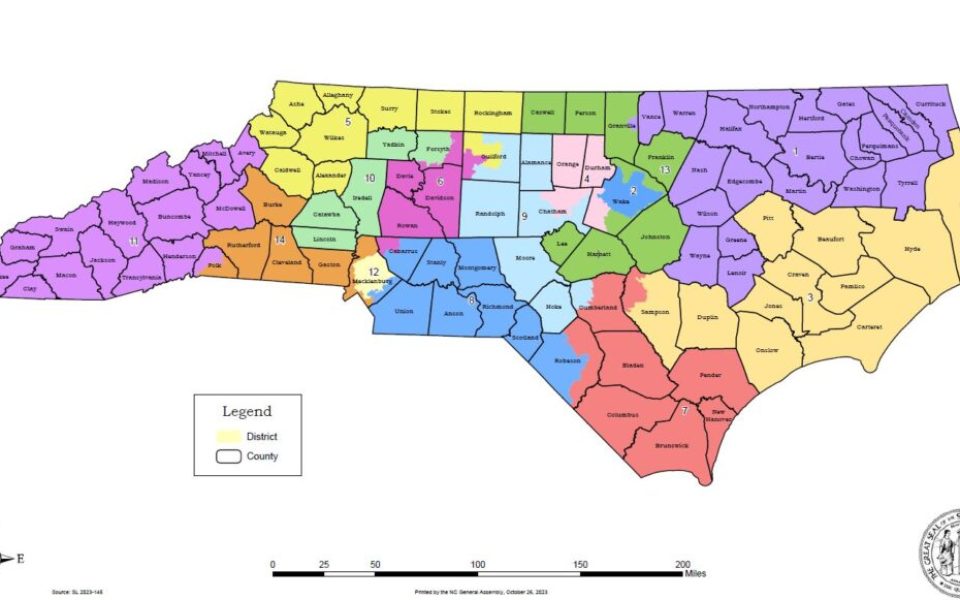Featured photo: The new NC congressional map creates 10 Republican districts, 3 Democratic districts and a district that is trending Republican (Source: NCGA)
This story was originally published by NC Newsline, story by Lynn Bonner
A group of Black and Latino voters in North Carolina say in a lawsuit that four of the state’s new congressional districts are racial gerrymanders. They are asking a panel of federal judges to declare it unconstitutional.
The lawsuit filed Monday focuses on Districts 1, 6, 12, and 14. These districts are unconstitutional because they intentionally weaken minority voting power, the lawsuit says.
Republican legislative leaders and chairmen of the House and Senate redistricting committees are named as defendants, along with the State Board of Elections.
Republicans hold a supermajority in both chambers. The congressional plan was approved along party-lines and with no input from Democrats.
Republican redistricting leaders said they did not use racial data to draw their redistricting plans, but did consider partisan data.
The lawsuit quotes a 2017 US Supreme Court decision in another North Carolina case over congressional districts: “the sorting of voters on the grounds of their race remains suspect even if race is meant to function as a proxy for other (including political) characteristics.”
The court-ordered map used in the 2022 election resulted in the voters electing seven Republicans and seven Democrats to Congress.
The new congressional plan Republicans approved has 10 Republican districts, three Democratic districts and one that is considered a toss-up.
The 1st District covers all of 20 eastern and northeastern counties in addition to a bit of Granville County. The district is represented by US Rep. Don Davis, a Democrat in his first term.
Various configurations of the district have elected Black candidates to Congress – all Democrats – since 1992, when Eva Clayton became the first Black candidate in North Carolina to win a US House seat since George Henry White was elected to a second term in 1898.
The redrawn 1st District is considered the toss-up district.
Minority communities were removed from the district, contrary to traditional redistricting principles, the lawsuit says.
For last year’s election, the 6th District included all of Guilford and Rockingham counties, most of Caldwell and part of Forsyth. It had a Black and Latino citizen voting age population of 35.6 percent, the lawsuit says. The redrawn congressional map carves Guilford into pieces and distributes the county’s precincts across three districts. The Black and Latino citizen voting age population in the 6th District was reduced to 23.5 percent, the lawsuit says.
Black and Latino voters were spread across districts in violation of traditional voting principles such as compactness and keeping communities of interest together, the lawsuit says. The cities of the Piedmont Triad, Greensboro, Winston-Salem and High Point, are divided across four congressional districts.
Democratic U.S. Rep. Kathy Manning represents the 6th District. The new 6th District and those surrounding it were drawn to elect Republicans.
The 12th District used in last year’s election included part of Charlotte, northern Mecklenburg County and western Cabarrus. The 14th District included part of Charlotte and eastern Gaston County. Democrat US Rep. Alma Adams was elected in the 12th District and Democrat Jeff Jackson was elected in 14th District last year.
The new 14th District includes all or part of six counties, including precincts along the western edge of Mecklenburg. The 12th District is contained within Mecklenburg. Minority communities were moved from the 14th District into the 12th District, the lawsuit says.
This is the second lawsuit filed this year over new redistricting plans. Two Black voters sued over the state Senate plan last month, saying districts in eastern and northeastern counties were drawn to dilute Black voting power.
NC Newsline is part of States Newsroom, a nonprofit news network supported by grants and a coalition of donors as a 501c(3) public charity. NC Newsline maintains editorial independence. Contact Editor Rob Schofield for questions: [email protected]. Follow NC Newsline on Facebook and Twitter.
Join the First Amendment Society, a membership that goes directly to funding TCB‘s newsroom.
We believe that reporting can save the world.
The TCB First Amendment Society recognizes the vital role of a free, unfettered press with a bundling of local experiences designed to build community, and unique engagements with our newsroom that will help you understand, and shape, local journalism’s critical role in uplifting the people in our cities.
All revenue goes directly into the newsroom as reporters’ salaries and freelance commissions.


Leave a Reply